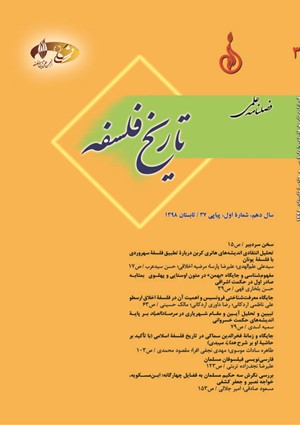تبیین و تحلیل آیین و مقام شهریاری در مرصادالعباد بر پایة اندیشههای حکمت خسروانی
محورهای موضوعی : پیوند اندیشۀ فیلسوفان و مکاتب فلسفی با زمانه و شرایط اجتماعی و فکری
1 - دانشگاه ولایت ایرانشهر
کلید واژه: حکمت خسروانی آیین شهریاری فرّه ایزدی ولايت الهي نجم رازی مرصادالعباد,
چکیده مقاله :
به استناد تعالیم آیین مزدیسنا و آموزههای اهورامزدا، مقام پادشاهی در ایران باستان دارای دو جنبۀ دینیاری و شهریاری یا حکمت و حکومت بوده كه هر دو جنبه با نیروی الهی (فرّ ایزدی) به پادشاه واگذار شده است. در حکمت اشراقي نیز نورالانوار که روشنکنندۀ عوالم است، همان خورنه در اوستا است که در فارسی امروز به آن فرّ میگویند. بموجب «فرّ» که موهبتی ایزدی و الهی است، فرد برخوردار، شایستۀ مقام پادشاهی میشود و پادشاهان فاضل و عادل در صورت عدول از دادگری از این موهبت محروم خواهند شد و فرّ از آنان جدا میشود. دیدگاه نجم رازی در مرصادالعباد نیز دربارۀ مقام شهریاران و پادشاهان و وظایف ایشان به اندیشههای ایران باستان و آموزههای مزدایی و حکمت خسروانی بسیار نزدیک است. او پادشاه را خلیفۀ خداوند در زمین میخواند و با تشبیه شاه به هما، بر شمول عنایت الهی بر این جایگاه و مقام صحه میگذارد؛ چنانكه میتوان گفت آنچه در حکمت خسروانی و حکمت اشراق فرّ کیانی نام دارد، در مرصادالعباد تحت عنوان قوت ربانی و تأیید آسمانی مطرح شده است. بر همین اساس رازی برای شهریاران ویژگیهایی را برمیشمارد که قابل تطبیق و مقایسه با آیین شهریاری در ادیان و آموزههای باستانی و حکمت خسروانی است. این پژوهش بر آنست تا با مبنا قراردادن مؤلفههای آیین شهریاری در حکمتهای باستانی، بويژه حکمت خسروانی، ویژگیهای پادشاهی در مرصادالعباد را برشمرده و به تبیین وجوه اشتراک و افتراق اندیشههای نجم رازی با مبانی حکمت خسروانی در زمینۀ آیین شهریاری بپردازد. نتيجة اين پژوهش نشان ميدهد كه رازي با توجه به جايگاه تفسير عرفاني خود و نيز توجه به معناي اشراقي و باطني حكمت خسرواني، پادشاهي را مترادف با ولايت الهي و آموزة فلسفي «حكيم حاكم» شمرده است و بعبارت ديگر، سالك واصلي كه در مرحلة فيالخلق بالحق بسر ميبرد. چنين فردي «شاه خاصي» است كه بدليل همين شايستگي مقام «شاه عام» يا حكمراني بر مردم پيدا كرده است.
According to the teachings of Zoroastrianism and Ahuramazda, the position of kingship in ancient Iran enjoys two aspects of religiousness and leadership or wisdom and government, which were both granted to the king in the light of divine power (farr-e īzadī). In Illuminationist philosophy, too, the light of all lights (al-nūr al-anwār), which illuminates all worlds, is the same khurneh in Avesta, which is referred to as farr (glory) in today’s Persian. In the light of farr, which is an īzadī and divine gift, the blessed person qualifies for the position of kingship. If any knowledgeable and just king deviated from the path of justice, he was deprived of this blessing and glory. Najm al-Dīn Rāzī’s view in Mirṣād al-‘ibād regarding the position of leaders and kings and their duties are very close to ancient Iranian thoughts, Zoroastrian teachings, and Khosrawani wisdom. He calls the king as God’s vicegerent on earth and, through assimilating the king to homā (a fabulous bird of good omen), he confirms God’s attention to this rank and position. Therefore, it can be said that what is called farr-e kiyānī (divine light) in Khosrawani wisdom and Illuminationist philosophy has appeared in Mirṣād al-‘ibād as divine power and heavenly confirmation. Accordingly, Rāzī refers to some specific features for kings which match those appearing in ancient religions and Khosrawani wisdom. The present study aimed to list the features of kings in Mirṣād al-‘ibād while considering the elements of kingship in ancient schools of philosophy, particularly Khosrawani wisdom, and then explain the similarities and differences between the thoughts of Najm al-Dīn Rāzī and the basic principles of Khosrawani wisdom regarding the necessary qualities and features of a king. The findings of the study demonstrate that, given the place of his own gnostic interpretation and the Illuminationist and Zahirite meaning of Khosrawani wisdom, Rāzī considered kingship to be the same as divine guardianship and the philosophical concept of “king philosopher” or, in other words, a wayfarer who has attained God and is now at the stage of “for the created through the Truth”. This individual is a “particular king” who has been granted the position of “people’s king” or the authority to rule people in the light of such characteristics.
